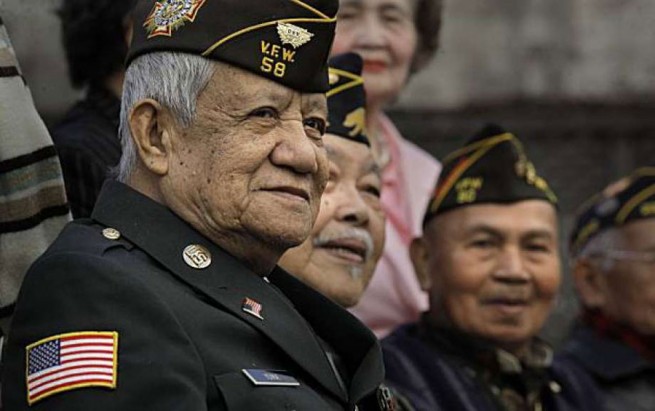Randolph “Rudy” Panaglima joined a Filipino guerrilla unit with his father when he was just 13 years old. The guerrillas were secretly working with the U.S. military during World War II.
Being so young helped Panaglima sneak past the Japanese to bring back information, food, and medicine to U.S. soldiers.
More than 250,000 Filipinos fought with the U.S. in the war. At least 60,000 of those were killed. When the war was over, President Truman signed laws that took away many of the rights that were promised to the Filipino soldiers.
70 years later, the Filipinos are getting some of those benefits back. The 2009 economic stimulus package included a lump sum payment to Filipino veterans.
Panaglima, 86, has four grown children who have been waiting to enter the United States since 1995. A new program authorized by President Obama will allow two of the sons to move to Washington to take care of their mother.
“That is what I am dreaming because of our age now,” said Panaglima, who was the featured speaker Thursday at a Capitol ceremony marking the Filipino World War II Veterans Parole program. The program will allow an estimated 2,000 to 6,000 Filipino-American World War II veterans living in the U.S. to be reunited with family members who live outside the U.S., mostly in the Philippines.
“Filipino World War II veterans have been waiting patiently for decades to be reunited with their families,” said Sen. Mazie Hirono, D-Hawaii, who worked with the Obama administration to create the program, which took effect Wednesday. The veterans and their spouses — most of whom are in their eighties or nineties “will finally be able to apply to bring their adult children to the United States,” Hirono said.
Retired Maj. Gen. Tony Taguba, a Philippines native who served in the U.S. Army for 34 years, said the reunification program begins to right a wrong “deeply rooted in American history.”
“Slowly but surely our country has taken leadership to correct this injustice,” Taguba said Thursday, noting that Filipino veterans who helped win World War II “paid a huge price”.
For those who survived, “the humiliation and indignation they suffered still resonate,” Taguba said.
Under the new program, U.S. Citizenship and Immigration Services will allow Filipino veterans and their spouses to apply for a grant of parole that allows family members to come to the United States as they wait for immigrant visas to be approved. In limited cases, some relatives will be able to seek parole on their own behalf if the World War II veteran or spouse is deceased.
https://www.youtube.com/watch?v=3xW8NLzLz3c
